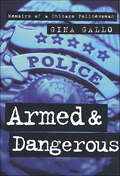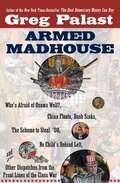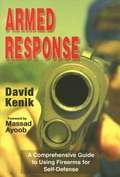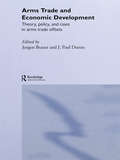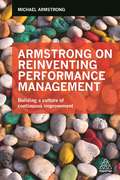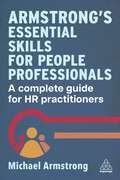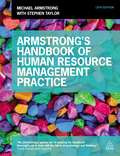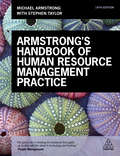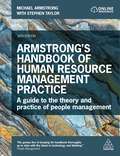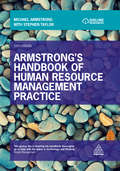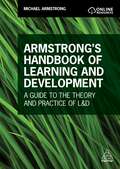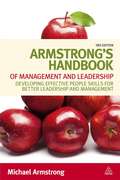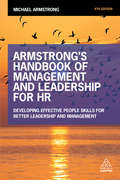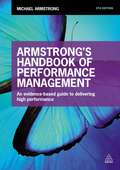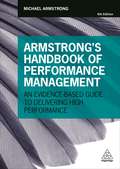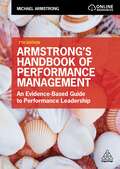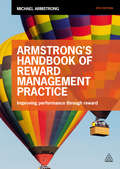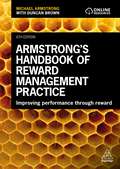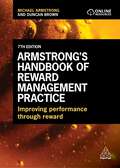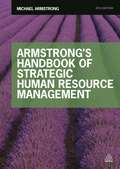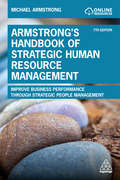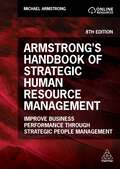- Table View
- List View
Armarium: Luxury Fashion Brands for Rent
by Jill Avery David G. Fubini Natasha Dossa Devon StewartCase - Armarium, a two-sided online platform that offered consumers the opportunity to rent the most coveted, current season high fashion clothing and accessories from the top global luxury brands, had emerged from its first sales season with two distinct customer segments: the High Net Worth (HNW) woman and the High Earner, Not Rich Yet (HENRY) woman. As it began to scale its operations, it had to decide which customer segment was the more desirable target market and how to refine the company's value proposition to maximize value creation for both consumers and the luxury brands that supported the business model. The jury was still out on whether a rental model could attract higher income women who could afford to buy luxury brands and whether it could support the $400 rental price points Armarium would need to charge for its one-of-a-kind pieces with retail values that could reach as high as $15,000. The two founders faced significant scaling challenges, from how to establish guardrails around curation of the collection to go-to-market distribution channel strategy and customer acquisition strategy.
Armarium: Luxury Fashion Brands for Rent
by Jill Avery David G. Fubini Natasha Dossa Devon StewartArmarium, a two-sided online platform that offered consumers the opportunity to rent the most coveted, current season high fashion clothing and accessories from the top global luxury brands, had emerged from its first sales season with two distinct customer segments: the High Net Worth (HNW) woman and the High Earner, Not Rich Yet (HENRY) woman. As it began to scale its operations, it had to decide which customer segment was the more desirable target market and how to refine the company's value proposition to maximize value creation for both consumers and the luxury brands that supported the business model. The jury was still out on whether a rental model could attract higher income women who could afford to buy luxury brands and whether it could support the $400 rental price points Armarium would need to charge for its one-of-a-kind pieces with retail values that could reach as high as $15,000. The two founders faced significant scaling challenges, from how to establish guardrails around curation of the collection to go-to-market distribution channel strategy and customer acquisition strategy.
Armed & Dangerous: Memoirs of a Chicago Policewoman
by Gina GalloThe critically acclaimed memoirs of one female police officer's sixteen-year odyssey, beginning with day one at the Police Academy and spanning assignments on Chicago's West Side, one of the most dangerous areas in the city.The notorious cops' code of silence is broken as the author recounts incidents in the West Side projects: shoot-outs, ambushes, and what it feels like to kill a man—just four days out of the Academy.The stories told are sometimes tragic, sometimes funny, often poignant, and always provide the reader with an on the scene feel for life behind the badge. Domestic violence, murdered spouses, abused children, and philandering CPD brass are just some of the topics addressed, topics that officer Gallo dealt with everyday.From her work with gangs, narcotics, the gun task force, and acting as a prostitute, Gina Gallo offers a gritty account of the darker side of the city, giving readers an objective side to the cops, crooks, and victims that comprise a the police cops world.At the Publisher's request, this title is being sold without Digital Rights Management Software (DRM) applied.
Armed Conflict, Women and Climate Change
by Jody M. PrescottThe gender-differentiated and more severe impacts of armed conflict upon women and girls are well recognised by the international community, as demonstrated by UN Security Council Resolution (UNSCR) 1325 on Women, Peace and Security and subsequent resolutions. Similarly, the development community has identified gender-differentiated impacts upon women and girls as a result of the effects of climate change. Current research and analysis has reached no consensus as to any causal relationship between climate change and armed conflict, but certain studies suggest an indirect linkage between climate change effects such as food insecurity and armed conflict. Little research has been conducted on the possible compounding effects that armed conflict and climate change might have on at-risk population groups such as women and girls. Armed Conflict, Women and Climate Change explores the intersection of these three areas and allows the reader to better understand how military organisations across the world need to be sensitive to these relationships to be most effective in civilian-centric operations in situations of humanitarian relief, peacekeeping and even armed conflict. This book examines strategy and military doctrine from NATO, the UK, US and Australia, and explores key issues such as displacement, food and energy insecurity, and male out-migration as well as current efforts to incorporate gender considerations in military activities and operations. This innovative book will be of great interest to students and scholars of international relations, international development, international security, sustainability, gender studies and law.
Armed Madhouse
by Greg Palast(From the book jacket) Greg's most provocative and caustically funny book yet, Armed Madhouse brings you the stories not allowed in The New York Times. Armed with more than fifty classified documents, confidential memos, and secret plans liberated from the Pentagon, FBI, World Bank, and ExxonMobil, Palast cuts through the TV news babytalk: Before invading, George Bush didn't have a secret plan to seize Iraq's oil-he had two. Palast shows you both. In "Who's Afraid of Osama Wolf?," Palast reveals the horror and humor of the War on Terror. In "The Network," Palast gives you the skinny on the new global order-and pushes Thomas Friedman over the edge of his Flat World. It was Palast, for BBC TV, who first uncovered how Jeb Bush and Katherine Harris stole Election 2000. Here he's got a new twist: Palast tells you that Kerry won in 2004-and that 2008 is already fixed.
Armed Response: A Comprehensive Guide to Using Firearms for Self-Defense
by David S. KenikAs someone raised in a gun culture, I've been very ambivalent about them. This book is compelling and rather frightening, pertaining to the utility of gun ownership and the "right" to own "personal" "concealed and carry" and "home defense" firearms, and is balanced with frank discussion of the moral, legal, physical and psychological consequences thereof... Those who find this book interesting may also want to read, "Essential Guide to Handguns: Firearm Instruction for Personal Defense and Protection," which is also available from Bookshare.
Arms Trade and Economic Development: Theory, Policy and Cases in Arms Trade Offsets (Routledge Studies in Defence and Peace Economics #Vol. 8)
by Jurgen Brauer Paul DunneCountries that spend scarce resources to import arms from abroad often require arms sellers to 'reinvest' part or all of the proceeds back into the arms-importing country. These so-called 'arms trade offsets' are therefore thought to enhance domestic economic development. But does this process actually succeed?This book examines the theory and policy applications of arms trade offsets and looks at more than a dozen case studies drawn from across Europe, Africa, Asia, and the Americas. The chapters, based on original research and published here for the first time, are all written by leading experts.That an impressive, lucid and cohesive volume such as this will interest defence economists can be taken almost for granted. The book will also be a useful and enlightening read for those interested in international development economics, military studies and policy-makers across the globe.
Armstrong on Reinventing Performance Management: Building a Culture of Continuous Improvement
by Michael ArmstrongArmstrong on Reinventing Performance Management presents a holistic approach to performance management, drawing on Michael Armstrong's vast research and experience. Most organizations have performance management processes in one form or another, but these are often based on formal annual reviews, forced rankings and directly linked to pay decisions. These traditional approaches are often at the expense of ongoing, continuous feedback and focus on looking back at what has or has not been achieved rather than looking forward. Direct links to pay decisions avert attention from people development, and managers often get lost in the bureaucracy of complex forms rather than fully engaging with their people. Armstrong on Reinventing Performance Management details how to build a culture of ongoing feedback and coaching and provides case studies of how this approach to building performance has been effective in organizations including Deloitte, Gap, Expedia and Google. Filled with practical advice, including how to deal with underperformers, it enables organizations to remove overly bureaucratic and ineffective systems based on top-down judgments and ratings, and demonstrates how to get line managers' support for the process focusing on actionable feedback and growth.
Armstrong's Essential Skills for People Professionals: A Complete Guide for HR Practitioners
by Michael ArmstrongA complete guide to the skills needed to be a successful people professional written by the UK's bestselling human resource management author.Armstrong's Essential Skills for People Professionals is a crucial resource for all current and aspiring HR practitioners. With coverage of fundamental skills such as interviewing, managing performance, reward and employee engagement, this book will equip you with the skills and confidence you need to be an outstanding people professional.Full of techniques for handling conflict and navigating challenging conversations, there is also guidance on managing equity, diversity and inclusion (EDI), supporting and communicating organizational change and contributing to the organization's environmental, social and governance (ESG) rating. This book also provides advice on the essential personal skills needed for success including problem-solving, decision-making and negotiation. Comprehensive yet accessible, this book provides you with the expertise required to deal with business issues as a HR professional.
Armstrong's Handbook of Human Resource Management Practice
by Michael Armstrong Stephen TaylorArmstrong's Handbook of Human Resource Management Practice is the classic text for all students and practitioners of HRM. Providing a complete resource for understanding and implementing HR in relation to the needs of the business as a whole, it includes in-depth coverage of all the key areas essential to the HR function. In addition it has two sections of toolkits with easily applicable skills and knowledge for the every needs of every practitioner. The 13th edition, introducing Stephen Taylor as co-author, has been updated throughout to reflect the latest thinking in HRM. It includes new information on employment law and a more detailed look at international concerns in HRM. Comprehensive online support material is provided for the instructor, student and now also the practitioner, providing a complete resource for teaching and self-learning.
Armstrong's Handbook of Human Resource Management Practice
by Michael Armstrong Stephen TaylorArmstrong's Handbook of Human Resource Management Practice is the bestselling, definitive text for all HRM students and professionals. Providing a complete resource for understanding and implementing HR in relation to the needs of the business as a whole, it contains in-depth coverage of all the key areas essential to the HR function such as employment law, employee relations, learning and development, performance and reward. Accessible and to the point as ever, this fully updated 14th edition includes emerging theory and practice, embracing the most current thinking on engagement, talent management and leadership development. With updated case studies and references to academic journals, professional magazines and recent research and surveys, it also includes coverage of new approaches to topics such as job evaluation and pay structures. Armstrong's Handbook of Human Resource Management Practice is aligned with the Chartered Institute of Personnel and Development (CIPD) professional map and standards, with the sections meeting CIPD learning outcomes now even clearer than before. Comprehensive online support material for instructors, students and HR managers are included. Resources for students and professionals include multiple-choice-questions, flash cards, case studies, further reading and a glossary of HRM terms. The lecturers' manual contains session notes, discussion questions, a literature review and a complete set of PowerPoint slides.
Armstrong's Handbook of Human Resource Management Practice: A Guide to the Theory and Practice of People Management
by Michael Armstrong Stephen TaylorArmstrong's Handbook of Human Resource Management Practice is the definitive resource for HRM students and professionals, helping readers understand and implement HR to align with business needs.This book provides detailed coverage of all areas essential to the HR function such as employment law, employee relations, learning and development, performance management and reward management. It also covers the HR skills needed to ensure professional success, including leadership, managing conflict, interviewing and using statistics. It is illustrated throughout in full colour and has a range of pedagogical features to consolidate learning such as source review boxes, key learning points and case studies from international organizations such as IBM, HSBC and Johnson and Johnson. This fully updated 16th edition includes new chapters on managing remote workers and developments in digital human resource management practices. There are also updates to reflect the changes throughout the HR function, such as performance leadership, 'smart' reward and employee wellbeing.Armstrong's Handbook of Human Resource Management Practice is suited to both professionals and students of undergraduate and postgraduate degrees. It is also aligned with the Chartered Institute of Personnel and Development (CIPD) profession map so can be used by those studying the Associate Level 5 and Advanced Level 7 qualifications. Online supporting resources include comprehensive handbooks for lecturers and students, lecture slides, all figures and tables, toolkits, and a literature review, glossary and bibliography.
Armstrong's Handbook of Human Resource Management Practice: Building Sustainable Organisational Performance Improvement (Kogan Page Ser.)
by Michael Armstrong Stephen TaylorArmstrong's Handbook of Human Resource Management Practice is the bestselling and definitive resource for HRM students and professionals, which helps readers to understand and implement HR in relation to the needs of the business. It covers in-depth all of the areas essential to the HR function such as employment law, employee relations, learning and development, performance management and reward, as well as the HR skills needed to ensure professional success, including leadership, managing conflict, interviewing and using statistics. Illustrated throughout in full colour and with a range of pedagogical features to consolidate learning (e.g. source review boxes, key learning points, summaries and case studies from international organizations such as IBM, HSBC and Johnson and Johnson), this fully updated 15th edition includes new chapters on the HRM role of line managers, evidence-based HRM, e-HRM and the gender pay gap, further case studies and updated content covering the latest research and developments.Armstrong's Handbook of Human Resource Management Practice is aligned with the Chartered Institute of Personnel and Development (CIPD) profession map and standards and is suited to both professionals and students of both undergraduate degrees and the CIPD's level 5 and 7 professional qualifications. Online supporting resources include comprehensive handbooks for lecturers and students, lecture slides, all figures and tables, toolkits, and a literature review, glossary and bibliography.
Armstrong's Handbook of Learning and Development: A Guide to the Theory and Practice of L&D
by Michael ArmstrongThis brand-new book from HRM expert and bestselling author, Michael Armstrong, is an ideal companion for those studying learning and development (L&D) at third year undergraduate and postgraduate level as well as practitioners in L&D roles in the workplace. Armstrong's Handbook of Learning and Development provides an essential grounding in L&D theory including the components of L&D, the distinction between L&D and training, the relationship of L&D to human resources and knowledge management as well as coverage of the role of an L&D practitioner. In addition, this book covers emerging areas of learning such as digital, social and workplace learning as well as some of the latest developments including micro, connected and personalized learning as well as earning experiences. There is also coverage of how to use AI, gamification and curation to support learning and how to host both online and offline learning events. Supported by case studies and examples to put the theory in context, reflective exercises to consolidate learning and further reading suggestions to broaden knowledge and engagement with the topic, Armstrong's Handbook of Learning and Development is crucial reading for academic success. The final part of the book includes additional aspects of L&D including apprenticeships, leadership development and personal and interpersonal skills development. Online resources include lecture slides for every chapter, a lecturer manual and student manual.
Armstrong's Handbook of Management and Leadership
by Michael ArmstrongArmstrong's Handbook of Management and Leadership provides guidance on the processes of management and leadership with particular reference to what managers and aspiring managers need to know and do to make a difference. As well as presenting the key skills required for effective management it also deals with three important areas of management: change management, continuous improvement and the achievement of high levels of customer service. The book is aligned to the Leading, Managing and Developing People and Developing Skills for Business Leadership modules which are part of the Chartered Institute of Personnel and Development's Leadership and Management Standards. and this new edition has been completely rewritten to bring it in line with these new modules. The book is accompanied by additional online material for use by instructors as well as an exhaustive set of questions and answers to help students test their learning.
Armstrong's Handbook of Management and Leadership for HR: Developing Effective People Skills for Better Leadership and Management
by Michael ArmstrongTo make an effective contribution, HR specialists have to be good at management, leadership and developing both themselves and others. They also need to be aware of the management and business considerations that affect their work. Armstrong's Handbook of Management and Leadership for HR provides guidance on the processes of management and leadership with particular reference to what HR managers and aspiring managers need to know and do to make a difference. Written by renowned human resources expert and bestselling author Michael Armstrong, Armstrong's Handbook of Management and Leadership for HR covers in one volume the 'Leading, Managing and Developing People' and 'Developing Skills for Business Leadership' Chartered Institute of Personnel and Development (CIPD) modules. It includes numerous practical features such as case studies, practitioner interviews, exercises and clear learning objectives to aid learning. This is the essential book for HR students and professionals looking to broaden their skills and understanding relating to management and leadership. Online supporting resources include lecture slides, an instructor's manual, a student's manual and a literature review.
Armstrong's Handbook of Performance Management
by Michael ArmstrongManaging staff performance is an effective mechanism for developing both staff and organizational growth. By clarifying an organization's objectives, translating these into clear individual goals and reviewing these goals regularly, performance management provides a well-structured and effective management tool. In the completely updated fifth edition of this classic text, Michael Armstrong considers the latest developments in this area, and how these can be applied to managing staff for increased performance. The new edition includes guidance on 360-degree feedback and the results of a far-reaching e-reward survey of performance management practices in 156 organizations. Ideal for practitioners and students alike, Armstrong's Handbook of Performance Management is aligned to the CIPD standards for Performance Management and so is ideal for those working towards the intermediate and advanced level qualifications. It remains the most authoritative and engaging textbook on performance management and is accompanied by an extensive online resource, including PowerPoint slides for tutors, and a glossary, literature review, and exercises to help students to test their learning.
Armstrong's Handbook of Performance Management: An Evidence-Based Guide to Delivering High Performance
by Michael ArmstrongArmstrong's Handbook of Performance Management addresses all areas of performance management, from performance pay and giving feedback to managing underperformers and having difficult conversations, so organizations can optimize staff performance. This fully updated and restructured 6th edition analyzes traditional as well as the latest developments in performance management including the shift from ratings and annual reviews. Veteran HR expert Michael Armstrong examines where these new approaches should be embraced and where traditional methods of performance management may be preferable. Packed with examples, exercises, checklists and new case studies from organizations such as Microsoft, IBM and Expedia, this book remains the most authoritative and engaging textbook on performance management. Supporting online resources for Armstrong's Handbook of Performance Management include an instructor's manual, a student's manual, lecture slides, a glossary of terms and a literature review.
Armstrong's Handbook of Performance Management: An Evidence-Based Guide to Performance Leadership
by Michael ArmstrongOptimizing staff performance is a key component of achieving outstanding business results. The new edition of Armstrong's Handbook of Performance Management is an essential companion for improving employee and organizational performance.From performance pay and giving feedback to managing underperformers, this handbook addresses all areas of performance management to enable students and practitioners to understand how to assess, measure and improve performance.This updated seventh edition contains new chapters on the meaning and development of performance management and managing performance with a remote workforce. It also covers performance leadership and multi-source feedback. Packed with examples to show how the theory applies in practice and exercises to consolidate student learning, Armstrong's Handbook of Performance Management remains an indispensable and engaging resource for securing effective performance across all aspects of the organization. Supporting online resources include an instructor's manual, lecture slides, a glossary and a literature review
Armstrong's Handbook of Reward Management Practice
by Michael ArmstrongArmstrong's Handbook of Reward Management Practice is the definitive guide to understanding, developing and implementing effective reward. It is closely aligned to the CIPD's standard in reward management and is supported by online resources for both lecturers and students. Updated to reflect the practical implications of the most recent research and discussion on reward management, this new fifth edition includes a new chapter on computerized reward management, completely updated chapters on job evaluation, pay structures, merit pay and executive pay, and new case studies. As with all of Armstrong's texts, this truly bridges the gap between academic and practitioner and is, therefore ideally suited to anyone studying for a professional qualification in HR, of which Reward is often a core part, in particular the CIPD's intermediate and advanced level qualifications. The online resources which accompany the book include questions, a glossary, bibliography and case studies for students, and notes and PowerPoint slides for lecturers.
Armstrong's Handbook of Reward Management Practice: Improving Performance Through Reward
by Michael Armstrong Duncan BrownArmstrong's Handbook of Reward Management Practice is the definitive guide to understanding, developing and implementing effective reward strategies. It covers all the essential aspects of improving organizational, team and individual performance through reward processes, including financial and non-financial rewards, job evaluation, grade and pay structures, rewarding specific employee groups and ethical considerations. This revised and updated sixth edition incorporates the latest research and developments and contains updated coverage of equal pay and the gender pay gap, employee benefits and total reward and a new chapter on employee financial wellbeing.As with all of Armstrong's texts, Armstrong's Handbook of Reward Management Practice bridges the gap between academic and practitioner and is ideally suited to both HR professionals and those studying for HR qualifications, including master's degrees and the CIPD's intermediate and advanced level qualifications. Tips and checklists and can be found throughout, alongside case studies from organizations including General Motors, the UK National Health Service and Tesco. Online supporting resources include lecture slides and comprehensive handbooks for lecturers and students, which include learning summaries, discussion questions and exercises, literature reviews and glossaries.
Armstrong's Handbook of Reward Management Practice: Improving Performance Through Reward
by Michael Armstrong Duncan BrownArmstrong's Handbook of Reward Management Practice is the essential guide to comprehending, developing and implementing effective reward strategies. This updated seventh edition incorporates the latest research and developments within reward management, including the reward implications of Covid and the 'great resignation' and rewarding remote and hybrid workers. Revisions also contain updates on reward structures, equal pay, employee benefits including wellbeing benefits, total rewards and smart rewards. This book covers all the crucial aspects of improving organizational, team and individual performance through reward processes, including financial and non-financial rewards, job evaluation, grade and pay structures, rewarding specific employee groups and ethical considerations. Armstrong's Handbook of Reward Management Practice bridges the gap between the academic and practitioner and is ideally suited to both HR professionals and those studying for HR qualifications, including master's degrees and the CIPD's intermediate and advanced level qualifications. Tips and checklists and can be found throughout, alongside case studies from organizations including General Motors, and the UK National Health Service. Online supporting resources include lecture slides and comprehensive handbooks for both lecturers and students, which include learning summaries, discussion questions, literature reviews and glossaries.
Armstrong's Handbook of Strategic Human Resource Management
by Michael ArmstrongStrategic human resource management has been taken up by academics, consultants and practitioners alike. However, the integration of human resource strategy with overall business strategy is often easier in theory than in practice. Armstrong's Handbook of Strategic Human Resource Management provides a bridge between theory and practice, serving as a guide both to formulating human resource strategies and to implementing them. This completely revised sixth edition examines HRM and SHRM as well as organizational and functional strategies from a practical standpoint. It includes brand new chapters on developing and delivering HR strategy, implementing individual performance strategies, creating and executing a corporate social responsibility strategy as well as a new discussion of international HRM strategies. Full of case studies, checklists and practical examples, Armstrong's Handbook of Strategic Human Resource Management is an indispensable resource for all those who are involved in putting complex strategy into practice to effect positive and productive change.
Armstrong's Handbook of Strategic Human Resource Management: Improve Business Performance Through Strategic People Management
by Michael ArmstrongArmstrong's Handbook of Strategic Human Resource Management is a complete guide to integrating HR strategies with wider organizational goals and objectives approaches to achieve sustained competitive advantage. Supported by key learning summaries, source reviews and practical real-life examples from organizations including UNICEF and General Motors (GM), it provides coverage of HRM strategies in key areas of the function such as employee engagement, talent management and learning and development, as well as strategic HRM approaches in an international context. This fully revised seventh edition of Armstrong's Handbook of Strategic Human Resource Management contains new chapters on evidence-based strategic HRM, employee wellbeing strategies and HR analytics, as well as additional case studies and updated wider content to reflect the latest research and thinking. It remains an indispensable resource for both professionals and those studying HR qualifications, including undergraduate and masters degrees and the CIPD's advanced level qualifications. Online supporting resources include lecture slides and comprehensive handbooks for lecturers and students which include self-assessment questions, case study exercises, and a glossary and literature review.
Armstrong's Handbook of Strategic Human Resource Management: Improve Business Performance Through Strategic People Management
by Michael ArmstrongArmstrong's Handbook of Strategic Human Resource Management is a complete guide to understanding how and why organizations integrate HR strategies to achieve and sustain their competitive advantage.This fully revised, practical guide contains new chapters on the foundation of strategic HRM, employee wellbeing strategies and HR analytics, as well as real-world examples and updated wider content to reflect the latest research and thinking. Now in its eighth edition, this book includes practical insights and in-depth coverage of HRM strategies in key areas such as employee engagement, talent management and learning and development, as well as strategic HRM approaches in an international context. It's supported by key learning points, key questions and real-life examples from organizations such as Boots, UNICEF and GKN. It remains an indispensable resource for both professionals and those studying HR qualifications, including undergraduate and masters' degrees and the CIPD's advanced level qualifications. Online resources include PowerPoint slides and comprehensive handbooks for lecturers and students which includes self-assessment questions, case study exercises and literature review.

